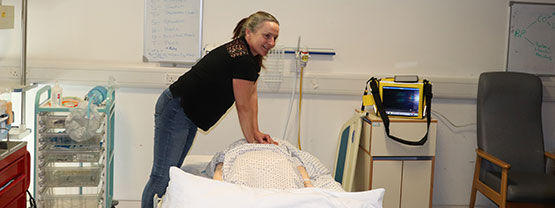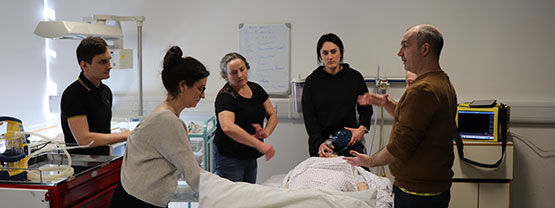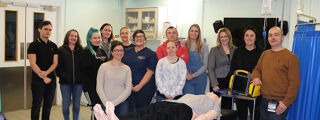ODP course lecturer, Laura Garbett has launched a new one-day training course, accredited by the Resuscitation Council UK (RCUK) for ILS (Immediate Life Support) and PILS (Paediatric Immediate Life Support).
All second-year Operating Department Practice students have been given the opportunity to take part in this qualification, as it is not embedded into their course. Once students successfully complete the course they will receive an RCUK-accredited certificate which is valid for one year.
The College of Operating Department practitioners recently mentioned the potential need for ILS in the future at their CUE forum, so we are taking the necessary steps to ensure that our ODP students are equipped to deal with real-life scenarios. The course plays a key role in giving professionals the knowledge, skills and ability to recognise deterioration early, and escalate to the appropriate senior clinician to start treatment without delay. This timely response to recognition and management of deterioration saves lives and of course forms the first link in the ‘chain of survival’.
About the qualification
The one-day course is delivered to ODP students by ODP lecturer and RCUK instructor Laura Garbett, alongside fellow RCUK instructors from our local practice partners to teach technical and non-technical skills.

We know that up to 80 per cent of in-hospital cardiac arrests can be identified some time before the cardiac arrest, therefore this ILS/PILS course teaches a structured approach to patient assessment using a structured ABCDE approach, clear communication tools (SBAR) as well as lifesaving skills such as airway management to help prevent patients further deteriorating whilst waiting for expert help to arrive.
It focuses on many acutely unwell patient scenarios through low fidelity simulation (for example; sepsis, anaphylaxis, hypovolemic shock etc.) to help improve confidence in the recognition of acute illness and prevent further deterioration.
The course also teaches resuscitation to an intermediate level covering the Advanced Life Support algorithm and safe defibrillation. This is important because we know that for every minute we delay shocking a shock-able cardiac arrest we reduce the chance of survival by 10 per cent. By covering this algorithm it also adds an added layer of preventing errors through human error. It also gives an introduction to team leadership skills which is becoming more and more important even at entry level to the profession.
First course is success
Following the delivery of the first course, Laura said: “The day was an absolute success with all 10 candidates successfully completing the course and becoming ILS certified.”
Student feedback following the course includes increased confidence and describing the course as being “very beneficial”.

Benefit to practice partners
The opportunity to undertake these accredited courses prior to qualification is a huge benefit to our practice partners and patients. Most NHS Trusts and private sector providers require their registered practitioners working within an acute setting to have this, so they do not have to arrange this training for newly-qualified practitioners.
Successful completion means that our students are now even further equipped with both the technical and non-technical skills to recognise and treat early signs of deterioration and ultimately, where required, manage a patient in cardiac arrest.






